国际商务谈判2
- 格式:ppt
- 大小:151.50 KB
- 文档页数:72
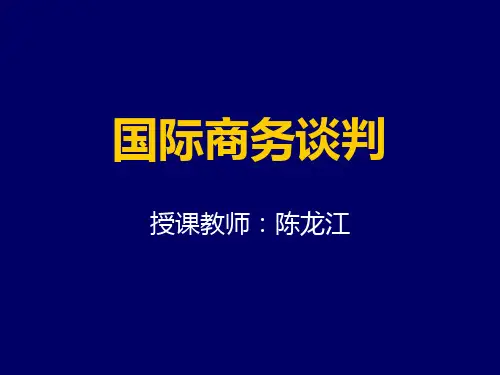

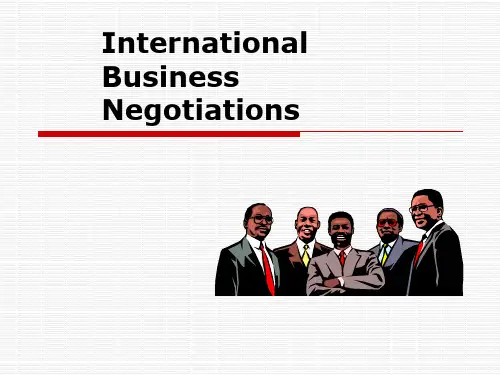

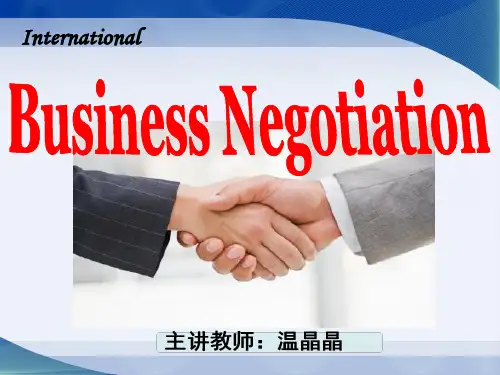

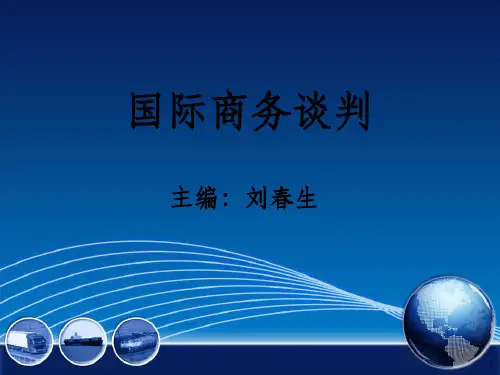
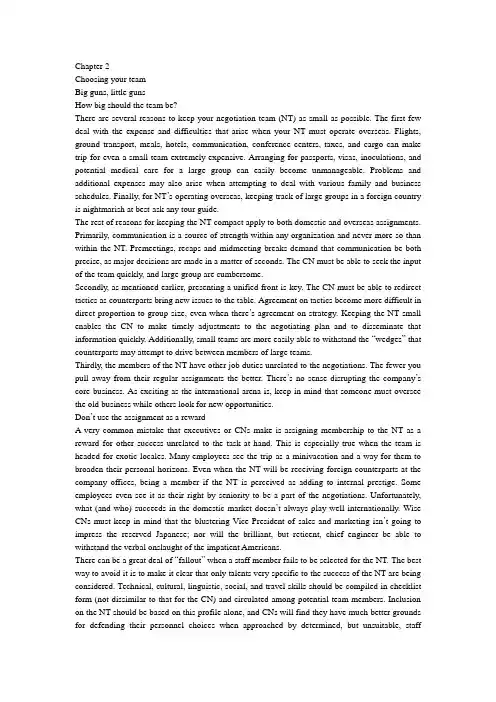
Chapter 2Choosing your teamBig guns, little gunsHow big should the team be?There are several reasons to keep your negotiation team (NT) as small as possible. The first few deal with the expense and difficulties that arise when your NT must operate overseas. Flights, ground transport, meals, hotels, communication, conference centers, taxes, and cargo can make trip for even a small team extremely expensive. Arranging for passports, visas, inoculations, and potential medical care for a large group can easily become unmanageable. Problems and additional expenses may also arise when attempting to deal with various family and business schedules. Finally, for NT’s operating overseas, keeping track of large groups in a foreign country is nightmarish at best-ask any tour guide.The rest of reasons for keeping the NT compact apply to both domestic and overseas assignments. Primarily, communication is a source of strength within any organization and never more so than within the NT. Premeetings, recaps and midmeeting breaks demand that communication be both precise, as major decisions are made in a matter of seconds. The CN must be able to seek the input of the team quickly, and large group are cumbersome.Secondly, as mentioned earlier, presenting a unified front is key. The CN must be able to redirect tactics as counterparts bring new issues to the table. Agreement on tactics become more difficult in direct proportion to group size, even when there’s agreement on strategy. Keeping the NT small enables the CN to make timely adjustments to the negotiating plan and to disseminate that information quickly. Additionally, small teams are more easily able to withstand the “wedges” that counterparts may attempt to drive between members of large teams.Thirdly, the members of the NT have other job duties unrelated to the negotiations. The fewer you pull away from their regular assignments the better. There’s no sense disrupting the company’s core business. As exciting as the international arena is, keep in mind that someone must oversee the old business while others look for new opportunities.Don’t use the assignment as a rewardA very common mistake that executives or CNs make is assigning membership to the NT as a reward for other success unrelated to the task at hand. This is especially true when the team is headed for exotic locales. Many employees see the trip as a minivacation and a way for them to broaden their personal horizons. Even when the NT will be receiving foreign counterparts at the company offices, being a member if the NT is perceived as adding to internal prestige. Some employees even see it as their right by seniority to be a part of the negotiations. Unfortunately, what (and who) succeeds in the domestic market doesn’t always play well internationally. Wise CNs must keep in mind that the blustering Vice President of sales and marketing isn’t going to impress the reserved Japanese; nor will the brilliant, but reticent, chief engineer be able to withstand the verbal onslaught of the impatient Americans.There can be a great deal of “fallout” when a staff member fails to be selected for the NT. The best way to avoid it is to make it clear that only talents very specific to the success of the NT are being considered. Technical, cultural, linguistic, social, and travel skills should be compiled in checklist form (not dissimilar to that for the CN) and circulated among potential team members. Inclusion on the NT should be based on this profile alone, and CNs will find they have much better grounds for defending their personnel choices when approached by determined, but unsuitable, staffmembers. This is especially true when other executives and managers assume they’re going to be part of the NT. As a way of preserving morale among those left off of the NT roster, some CNs make the deferrees part of the prenegotiation strategy planning process.A balance of skills and strengthsIt’s unlikely that any single team member will embody all of the talents necessary to achieve the company’s strategy. The CN must choose a cross-section of technical skills and personal attributes that will create a compact and efficient team. One team member’s weakness must be offset by another’s strength. Technical prowess must be a accompanied by the ability to communicate and apply that prowess. Putting a team together is similar to assembling a jigsaw puzzle: there’s no success unless all of the pieces fit.A common practice among experienced travelers when packing for trips is to never put anything in the suitcase that has “only one use”; the same applies to choosing NT members. A specialist candidate is eschewed in favor of the generalist unless the technical expertise is absolutely crucial to the effort. If the CN must include these “one trick ponies,” every attempt should be made to make them a part of the wider strategy and tactics discussions. If that’s unsuccessful, these specialist members should be cautioned to advise in private during negotiations and to avoid direct involvement.Painting the “big picture”Although many technical types will disagree, it’s much easier to impart technical knowledge to a good communicator than it is to do the reverse. Members of the NT must be chosen for their ability to effectively execute the company’s strategy and to quickly respond to the tactics of counterparts. This is accomplished only through good communications skills. Scientific and financial technical skills will take a back seat, especially during initial negotiations, as the “big picture” is discussed. Details will be left until much later in the process. Many business cultures prefer to have the details tended to after the contract is signed.Bringing massive technical data to the negotiating table may only slow down the deal-making process.NOTE: Much “expertise can be carried in file or laptop form, in case it should be needed during discussions.Tasks Both Large and smallMajor decisions are made every day during negotiations, but not all of the work is momentous. Some companies and consultant CNs make the mistake of including only “big guns” on the team. This causes problems, as no one relishes doing the necessary but tedious (and decidedly unglamorous ) work that keeps negotiations running smoothly—getting copies, typing policy changes, taking notes, arranging dinners, and so on .Including a few junior managers or administrators in the ranks of the NT for the sole purpose of controlling logistics is a wise move. This is particularly helpful if these members have experience working or traveling in the target market. Should the finances or domestic needs of the company preclude this option, these administrative duties should be assigned to specific members of the team, and it should be made clear that these duties are as important as any of the ,more “spot light”tasks. As is true in other areas of business, what happens behind the scenes determines success on the stage.Home Team Versus VisitorsThe respective sizes of the NT is usually determined by the group that’s visiting.This is particularly true if the visiting team is in the position of . “buying” from the home team or receiving group. The visiting group should forward a list of its members, stipulating the job title and responsibility of each. The receiving group should assemble their NT to correspond to the visiting team.It’s true that the receiving team has the psychological advantage of operating from their home turf, but they should resist the urge to overwhelm their visitors with an imposingly large NT. Since these resources can be called upon at any time, it’s best to see if they, re needed before arraying them. The ability to successfully exploit the discomfort of counterparts is very much related to one’s culture and requirements for a “success”. Some visitors may be in awe of your facilities and staff while others may consider it a visitors may be in awe of your is generally better when making initial contact.“Observer” TrainingCompanies that regularly pursue international trade and investment like to use negotiation as an ongoing training tool by purposely including less experienced members on the team. This allows them to gain experience that can be put to use in future international negotiations. It’s best to make it clear to these junior team members exactly why they’re being included in the NT so that they’re keen to gain as much experience as possible, get “bloodied” by their own mistakes, and learn from those of other team members .It’s also an ideal way for the company to see how their future CNs handle new and difficult situations. Many executives will attest to the fact that the “rising stars from the home office often become confused and ill-at-ease when put into the crucible of international negotiations and travel. Conversely, the mediocre manager may flourish in the new international environment.Those Who Can’“CUT IT”A common question in business when determining whether someone will be a success is , “Can they cut the muster?” (Sorry, folks, it isn’t mustard.) During the Middle Ages, the muster in question was the final pattern cut from cloth by journeymen to be used by the master tailor. Cut improperly, the pattern will never work, and valuable cloth will be ruined. International negotiations have a similar one-chance-is-all-you-get sense of finality. The NT acts as the journeymen and the CN is the master tailor preparing to stitch together a successful negotiation. Below are some types of people to avoid because they won’t be able “to cut it.”WHINERSEmployees who constantly complain, even under good conditions, are going to find travel and the stress of negotiations intolerable. These types love to bring up problems but never offer solutions. Every company has them, but successful negotiating teams don’t.CONNIVERSUnity is paramount for negotiations and people who like to work their own agenda or jockey for position will only undermine the team’s effort. These types are generally keen strategies and they may be useful in planning. However, under no circumstances should they ever take an active role in negotiations.HOTHOUSE FLOWERSMore competent than whiners, these “high maintenance”types can only excel under ideal circumstances. They never complain but are easily set back by the slightest deviation form the norm. Unfortunately, negotiations and overseas travel are rarely conducive to ideal anything. Sometimes, the NT must operate when materials and equipment are lost, or work in environmentsin which electricity is some trials reserved for special occasions. Technically astute or not, these “flowers” won’t travel well. If they must be used, do so only when negotiations are on home turf. An overseas team needs those that can adapt to any environment.BIGOTSNegotiations are a zero-sun game based on finding common ground amid very real and distinct differences. Adding racial, cultural, or class bigotry will only obscure an already complex state of affairs. Bigots (of any ilk) tend to communicate their prejudices more than they realize, and it’s not the kind of communication that leads to a successful deal.The frailRegardless of where the team originated, the world outside of the domestic market is filled with sights, sounds, smells, and tastes that pummel the visitor. Part of the success of the NT will be in its ability to assimilate as quickly as possible into the environment of their target market. The hygienic and culinary habits of counterparts and their culture may not meet the standards of the NT’s domestic scene. Members who can’t quickly and adequately adjust to new environments will only be a burden to the whole team, thus disrupting strategies and assignments. Like the CN, the team must be robust.Overseas? Domestic? One core team?Optimally, once a team is assembled, it should be used for both overseas and domestic negotiations related to international business. (Specialists may be added for individual negotiations.) This is especially true for smaller companies with limited resources. But large companies should not make the mistake of having two separate teams-one for overseas and one for domestic discussions-simply because they can afford the expense. Teams that have operated overseas will understand the stresses and strains being exerted on foreign teams when they come for business visits. This information, used sympathetically or otherwise, can be a key part of the overall strategy and daily tactics. Lastly, using the team for all negotiations will add to its ability to operate as a unit as team members become expert at all aspects of negotiating. They must be able to visit as well as host a negotiation and understand the responsibilities of being on either side of the table.。
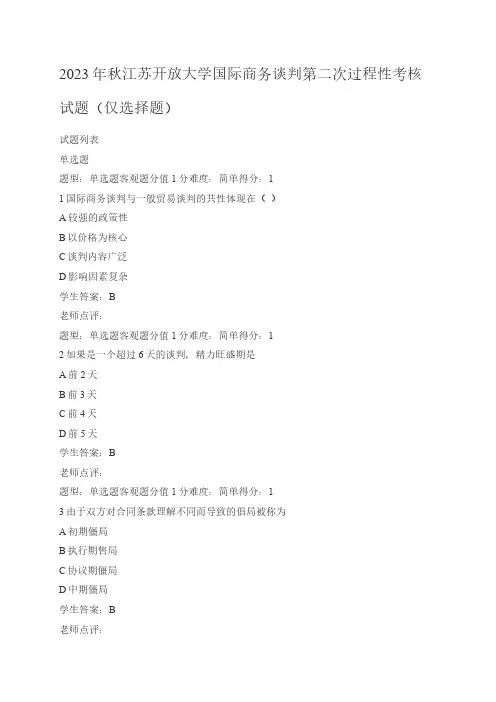
2023年秋江苏开放大学国际商务谈判第二次过程性考核试题(仅选择题)试题列表单选题题型:单选题客观题分值1分难度:简单得分:11国际商务谈判与一般贸易谈判的共性体现在()A较强的政策性B以价格为核心C谈判内容广泛D影响因素复杂学生答案:B老师点评:题型:单选题客观题分值1分难度:简单得分:12如果是一个超过6天的谈判,精力旺盛期是A前2天B前3天C前4天D前5天学生答案:B老师点评:题型:单选题客观题分值1分难度:简单得分:13由于双方对合同条款理解不同而导致的倡局被称为A初期僵局B执行期售局C协议期僵局D中期僵局学生答案:B老师点评:多选题题型:多选题客观题分值1分难度:简单得分:1 1以下有关俄罗斯人谈判风格的描述贴切的有A豪放热心B浪漫随意C求成心切D效率较高E缺乏信任感学生答案:A;B;D老师点评:题型:多选题客观题分值1分难度:简单得分:1 2谈判双方交锋中的技巧有A多听少说B有问必答C巧提问题D使用条件问句E避免跨国文化交流产生的歧义学生答案:A;C;D;E老师点评:题型:多选题客观题分值1分难度:简单得分:1 3打破谈判中僵局的做法有A改期再谈B采取横向式的谈判C采取纵向式的谈判D改变谈判环境与气氛E换谈判人员或者由领导出面调解学生答案:A;B;D;E老师点评:题型:多选题客观题分值1分难度:简单得分:1 4沉默的谈判对手的心理待征是A非常固执B不自信C想逃避D行为表情不一致E给人感觉不热情学生答案:B;C;D;E老师点评:题型:多选题客观题分值1分难度:简单得分:1 5际商务谈判的特殊性体现在A具有较强的政策性B应按国际惯例办事C谈判议程简单D影响因素复杂多样E谈判内容广泛学生答案:A;B;D;E老师点评:题型:多选题客观题分值1分难度:简单得分:1 6国际商务谈判中的市场风险具体有A投资风险B利率风险C汇率风险D价格风险学生答案:B;C;D老师点评:题型:多选题客观题分值1分难度:简单得分:1 7谈判中迂回入题的方法有A从题外语入题B从自谦入题C从确定议题入题D从询问对方交易条件入题学生答案:A;B老师点评:题型:多选题客观题分值1分难度:简单得分:1 8选择自己所在单位作为谈判地点的优势有A便于侦察对方B容易寻找借口C易向上级请示汇报D方便查找资料与信息学生答案:C;D老师点评:题型:多选题客观题分值1分难度:简单得分:1 9迫使对方让步的主要策略有A利用竞争B最后通牒C最后通牒D软硬兼施学生答案:A;C;D老师点评:题型:多选题客观题分值1分难度:简单得分:1 10进行报价解释时必须遵循的原则是A不问不答B有问必答C避实就虚D能言不书学生答案:A;B;C;D老师点评:题型:多选题客观题分值1分难度:简单得分:1 11谈判议程的内容包括A模拟谈判B时间安排C确定谈判议题D确定谈判人员学生答案:B;C老师点评:题型:多选题客观题分值1分难度:简单得分:112谈判信息传递的基本方式有A明示方式B暗示方式C广告方式D意会方式学生答案:A;B;D老师点评:题型:多选题客观题分值1分难度:简单得分:113国际经济贸易活动中解决争端的普遍的、基本的方式是A第三方协调B仲裁C诉讼D贸易报复学生答案:B;C老师点评:题型:多选题客观题分值1分难度:一般得分:114对谈判人员素质的培养包括A家庭的培养B社会的培养C企业的培养D自我培养学生答案:B;C;D老师点评:题型:多选题客观题分值1分难度:一般得分:115还盘的具体方法有A询问对方的交易条件B拒绝成交C请求重新发盘D修改发盘学生答案:C;D老师点评:题型:多选题客观题分值1分难度:一般得分:116关于国际货物买卖的国际惯例主要有A《国际贸易术语解释通则》B《华沙–牛津规则》C《海牙规则》D《美国1941年修订的国际贸易定义》学生答案:A;B;D老师点评:填空题题型:填空题主观题答案不允许乱序分值1分难度:简单得分:11探索式发问学生答案:探索式发问是针对对方答复要求引申或举例说明,以便探索新问题、找出新方法一种发问方式题型:填空题主观题答案不允许乱序分值1分难度:简单得分:12开局阶段学生答案:开局阶段主要是指谈判双方见面后,在讨论具体、实质性交易内容之前,相互介绍、寒暄以及就谈判内容以外话题进行交谈那段时间。
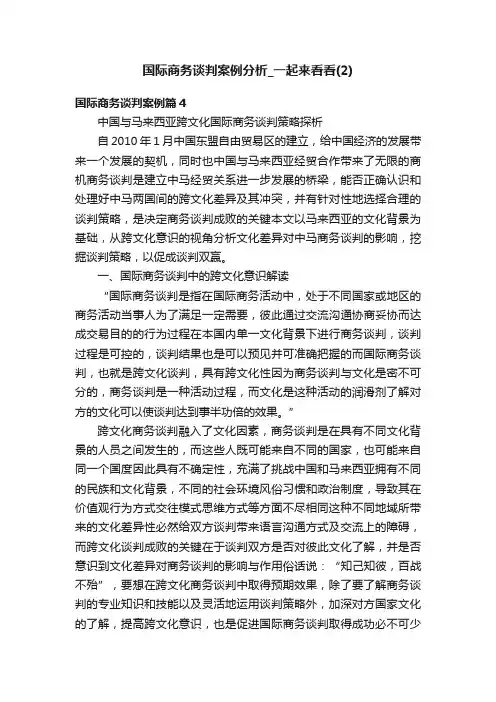
国际商务谈判案例分析_一起来看看(2)国际商务谈判案例篇4中国与马来西亚跨文化国际商务谈判策略探析自2010年1月中国东盟自由贸易区的建立,给中国经济的发展带来一个发展的契机,同时也中国与马来西亚经贸合作带来了无限的商机商务谈判是建立中马经贸关系进一步发展的桥梁,能否正确认识和处理好中马两国间的跨文化差异及其冲突,并有针对性地选择合理的谈判策略,是决定商务谈判成败的关键本文以马来西亚的文化背景为基础,从跨文化意识的视角分析文化差异对中马商务谈判的影响,挖掘谈判策略,以促成谈判双赢。
一、国际商务谈判中的跨文化意识解读“国际商务谈判是指在国际商务活动中,处于不同国家或地区的商务活动当事人为了满足一定需要,彼此通过交流沟通协商妥协而达成交易目的的行为过程在本国内单一文化背景下进行商务谈判,谈判过程是可控的,谈判结果也是可以预见并可准确把握的而国际商务谈判,也就是跨文化谈判,具有跨文化性因为商务谈判与文化是密不可分的,商务谈判是一种活动过程,而文化是这种活动的润滑剂了解对方的文化可以使谈判达到事半功倍的效果。
”跨文化商务谈判融入了文化因素,商务谈判是在具有不同文化背景的人员之间发生的,而这些人既可能来自不同的国家,也可能来自同一个国度因此具有不确定性,充满了挑战中国和马来西亚拥有不同的民族和文化背景,不同的社会环境风俗习惯和政治制度,导致其在价值观行为方式交往模式思维方式等方面不尽相同这种不同地域所带来的文化差异性必然给双方谈判带来语言沟通方式及交流上的障碍,而跨文化谈判成败的关键在于谈判双方是否对彼此文化了解,并是否意识到文化差异对商务谈判的影响与作用俗话说:“知己知彼,百战不殆”,要想在跨文化商务谈判中取得预期效果,除了要了解商务谈判的专业知识和技能以及灵活地运用谈判策略外,加深对方国家文化的了解,提高跨文化意识,也是促进国际商务谈判取得成功必不可少的前提和基础。
二、中马商务谈判的个案分析及跨文化问题(一)案例综述中国桂林风情旅行社邀请马来西亚一家旅行社洽谈一笔国际旅游业务经双方约定于某日上午十点在桂林榕湖饭店进行洽谈风情旅行社派车接马来西亚旅行社代表来榕湖饭店进行洽谈由于他们是第一次到桂林对桂林的美景流连忘返,以致路上耽搁了时间晚到了一个小时,后在商讨价格时,因双方提出的交易条件与价格相差较大中方代表有点不悦,谈判中失去耐心来了情绪,说话声音过高,且在条件与价格方面不肯做出让步而马方代表年纪较大,认为中方代表的言语举动对他们不礼貌不尊重在享用午宴过程中中方代表为了增进双方感情拿出接待贵宾专用酒茅台并极力劝说马方代表饮用又由于中方忽略了马来西亚旅行社代表是穆斯林,在午宴中点了青菜但忘记嘱咐厨师不要用猪油来炒被马方认为没有诚意,生气的离开了致使谈判陷入了僵局。
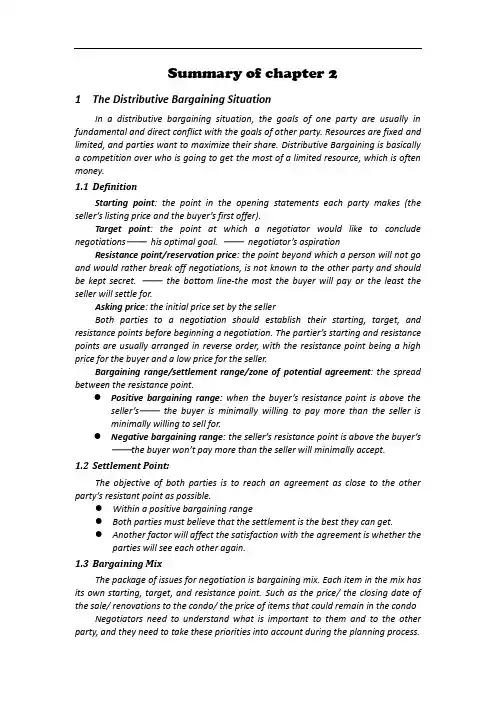
Summary of chapter 21The Distributive Bargaining SituationIn a distributive bargaining situation, the goals of one party are usually in fundamental and direct conflict with the goals of other party. Resources are fixed and limited, and parties want to maximize their share. Distributive Bargaining is basically a competition over who is going to get the most of a limited resource, which is often money.1.1DefinitionStarting point: the point in the opening statements each party makes (the seller’s listing price and the buyer’s first offer).Target point: the point at which a negotiator would like to conclude negotiations——his optimal goal. ——negotiator’s aspirationResistance point/reservation price: the point beyond which a person will not go and would rather break off negotiations, is not known to the other party and should be kept secret. ——the bottom line-the most the buyer will pay or the least the seller will settle for.Asking price: the initial price set by the sellerBoth parties to a negotiation should establish their starting, target, and resistance points before beginning a negotiation. The partier’s starting and resistance points are usually arranged in reverse order, with the resistance point being a high price for the buyer and a low price for the seller.Bargaining range/settlement range/zone of potential agreement: the spread between the resistance point.⚫Positive bargaining range: when the buyer’s resistance point is above the seller’s——the buyer is minimally willing to pay more than the seller isminimally willing to sell for.⚫Negative bargaining range: the seller’s resistance point is above the buyer’s ——the buyer won’t pay more than the seller will minimally accept.1.2Settlement Point:The objective of both parties is to reach an agreement as close to the other party’s resistant point as possible.⚫Within a positive bargaining range⚫Both parties must believe that the settlement is the best they can get.⚫Another factor will affect the satisfaction with the agreement is whether the parties will see each other again.1.3Bargaining MixThe package of issues for negotiation is bargaining mix. Each item in the mix has its own starting, target, and resistance point. Such as the price/ the closing date of the sale/ renovations to the condo/ the price of items that could remain in the condo Negotiators need to understand what is important to them and to the other party, and they need to take these priorities into account during the planning process.1.4Fundamental Strategies1.4.1Discovering the other party’s resistance pointThe more you can learn about the other party’s target, resistance point, motives, feelings of confidence, and so on, the more able you will be to strike a favorable agreement.To influence the other party’s perception, however, they must establish some points effectively and convincingly.1.4.2Influencing the other party’ s resistance pointFactors are important in attempting to influence the other party’s resistance point:(1) the value the other attaches to a particular outcome(2) the cost the other attaches to delay or difficulty in negotiations(3) the cost the other attaches to having the negotiation aborted.A significant factor in shaping the other person’s understanding of what is possible is the other’s understanding of your own situation.1.4.3Propositions:1. The higher the other party’s estimate of your cost of delay or impasse, the stronger the other party’s resistance point will be.2. The higher the other party’s estimate of his or her own cost of delay or impasse, the weaker the other party’s resistance point will be.3. The less the other values an issue, the lower their resistance point will be.4. The more the other believes that you value an issue, the lower their resistance point may be.Case:In the condo example, the buyer has four fundamental strategies available:(1) To push for a settlement close to the seller’s resistance point. $ 130,000(2) To convince the seller to change her resistance point.(3) If a negative settlement range exists, to convince the seller to reduce her resistance point.(4) To convince the seller to believe that this settlement is the best that is possible.2Tactical TasksThere are four important tactical tasks for a negotiator in a distributive bargaining situation to consider:2.1Assess the other party’s target, resistance point, and cost of terminating negotiation.The negotiator can pursue two general routes to achieve this task:⚫Obtain information indirectly about the background factors behind an issue (indirect assessment).⚫Obtain information directly from the other party about their target andresistance point (direct assessment) .2.2Manage the other party’s impressions of a negotiator’s target, resistance point, and cost of terminating negotiation.An important tactical task for negotiators is to control the information sent to the other party about your target and resistance points, while simultaneously guiding him or her to form a preferred impression of them.Negotiators need to screen information about their positions and to represent them as they would like the other to believe them.⚫Screening Activities.The simplest way to screen a position is to say and do as little as possible. “Silence is gold.”Another approach, available when group negotiations are conducted through a representative is calculated incompetence.Reduce the number of people who can actively reveal information.Present a great many items for negotiations only a few of which are truly important to the presenter.⚫Direct Action to Alter Impressions.Many actions can be taken to present facts that will that will enhance their position or make it appear stronger to the other party.Negotiators should justify their positions and desired outcomes in order to influence the other party’s impressions.Displaying emotional reaction to facts, proposals, and possible outcomes is another form of direct action.Taking direct action to alter another’s impression raises several potential hazards.2.3Modify the other party’s perceptions of his own target, resistance point, and cost of terminating negotiation.⚫Interpret for the other party what the outcomes of his or her proposal will be.⚫Conceal information.2.4Manipulate the other party’s actual cost of delaying or terminating negotiation.(1) Disruptive Action. Increase the cost of not reaching a negotiated agreement.(2) Alliance with Outsiders. Involve the other parties who can somehow influence the outcomes in the process.(3) Schedule Manipulation. The negotiation scheduling process can often put one party at a considerable disadvantage. The opportunities to increase or alter the timing of negotiation vary widely across negotiation domain.3Position Taken during NegotiationEffective distributive bargainers need to understand the process of makingpositions during bargaining, including the importance of opening offer, opening stance, and the role of making concessions throughout the negotiation process.3.1Opening OffersThe fundamental question is whether the opening offer should be exaggerated or modest.There are at least two reasons that an exaggerated opening offer is advantageous.Two disadvantageous of exaggerated opening offer are:(1) It maybe summarily rejected by the other party(2) it communicates an attitude of toughness that maybe harmful to long-term relationships.3.2Opening StanceWill you be competitive or moderate? It is important for negotiators to think carefully about the messages that the wish to signal with their opening stance and subsequent concessions. To communicate effectively, a negotiator should try to senda consistent messages through both opening offer and stance.3.3Initial ConcessionsFirst concession conveys a message, frequently a symbolic one to the other party that how you will proceed.Firmness may actually shorten negotiations, there is also the very real possibility, however, it will be reciprocated by the other.There are good reasons for adopting a flexible position.3.4Role of ConcessionsConcessions are central to negotiation. Negotiators also generally resent a take-it-or-leave-it approach. Parties feel better about a settlement when the negotiation involved a progression of concession. A reciprocal concession cannot be haphazard.To encourage further concession from the other party, negotiators sometimes link their concessions to a prior concession made by the other party.3.5Final OffersA negotiator might simply let the absence of any further concessions that convey the message in spite of urging the other party.One way negotiators may convey the message that an offer is the one is to make the last concession more substantial.4Commitment4.1Establishing a CommitmentA commitment statement has three properties: a high degree of finality, ahigh degree of specificity, and a clear statement of consequences.Several ways to create a commitment:⚫public pronouncement⚫linking with an outside base⚫increase the prominence of demands⚫reinforce the threat or promise4.2Preventing the other party from committing prematurelyOne way to prevent the other party from establishing a committed position is to deny his or her the necessary time.Another approach is to ignore or downplay a threat by not acknowledging the other party’s commitment, or even by making a joke about it.There are times, however, when itis to a negotiator’s advantageous for the other party become committed.4.3Finding ways to abandon a committed positionFour avenues for escaping commitment:⚫Play a way out⚫Let it die silently⚫Restate the commitment⚫Minimize the damageA commitment position is a powerful tool in negotiation, it is also a rigid tool and must therefore be used with care.5Closing the dealSeveral tactics are available to negotiators for closing a deal:⚫Provide alternatives⚫Assume the close⚫Split the differences⚫Exploding the offers⚫Sweeteners6Hardball TacticsSuch tactics are designed to pressure negotiators to do things they would not, otherwise do, and their presence usually disguises the user’s adherence to a decidedly distributive bargaining approach.6.1Tactics 1How best to respond to a tactic depends on your goals and the broader context of the negotiation.Four main options that negotiators have for responding to typical hardball tactics:⚫lgnore them⚫Discuss them⚫Respond in kind⚫Co-opt the other party6.2Tactics 2BogeyNegotiators using the bogey tactic pretend that an issue of little or no importance to them is quite important. This tactic is fundamentally deceptive, and it can be a difficult to enact. Bogeys occurs more often by omission than commission.The NibbleNegotiators using the bogey tactic ask for a proportionally small concession on a item that hasn’t been discussed previously in order to close the deal.6.3Tactics 3ChickenNegotiators using this tactic combine a large bluff with a threatened action to force the other party to “chicken out” and give them what they want.Weakness: It turns negotiation into a serious game in which one or both parties find it difficult to distinguish reality from postured negotiation positions.It is very difficult for negotiators to defend against.6.4Tactics 4IntimidationThey all attempt to force the other party to agree by means of an emotional poly, usually anger or fear. Another form of intimidation includes increasing the appearance of legitimacy.Guilt can also be used as a form of intimidation.Two effective strategies for dealing with intimidation: discuss the negotiation process with the other party; use a team to negotiate with the other party.6.5Tactics 5Aggressive BehaviorNegotiators using this tactic is signaling a hard-nosed intransigent position and trying to force the other side to make many concessions to reach an agreement.Ways to deal with: halt the negotiations in order to discuss the negotiation process itself.Snow JobIt occurs when the negotiator overwhelm the other party with so much information that he has trouble in determining which facts are real.7Several available responses to counter this tactic.Distributive Bargaining Skills Applicable to Integrative NegotiationMany of the skills are also applicable to the latter stages of integrative negotiation when negotiators need to claim value, that is decide how to divide their joint gains.Care needs to be taken, however, not to seriously change the tone of those negotiations by adopting an overtly aggressive stance at this stage.。
国际商务谈判试题( 02)课程代码: 00186一、单项选择题(本大题共 20小题,每小题 1 分,共 20分)在每小题列出的四个备选项中只有一个是符合题目要求的,请将其代码填写在题后的括号内。
错选、多选或未选均无分。
1.国际商务谈判与一般贸易谈判的共性体现在()A.较强的政策性 B .以价格为核心C.谈判内容广泛 D .影响因素复杂2.商务谈判人员的最佳年龄一般在()A.20~45 岁 B . 25~ 55 岁C.30~55 岁 D . 40~ 60 岁3.在任何欧洲国家都只用于万圣节和葬礼,而不宜送人的花是()A.荷花 B .菊花C.玫瑰花 D .茉莉花4.套期保值者根据现货交易情况,先在期货市场上建立空头交易地位,然后再以多头进行平仓的做法叫()A.卖期保值 B .买期保值C.掉期交易 D .期权交易5.双方谈判人员适当互赠礼品的做法是()A.求助 B .贿赂C.为了理解 D .润滑策略6.在谈判的交锋过程中,成功的谈判者花在听上的时间占到总谈判时间的()A. 30%以下 B . 30%~ 40%C. 40%~ 50% D . 50%以上7.无论穿什么,都不会把手放到口袋里,因为这样做会被认为是粗鲁的。
具有这种行为习惯的是()A.德国人 B .美国人C.韩国人 D .日本人8.在国际商务谈判中,认为手帕象征亲人离别,是不祥之物,不能送人的国家是()A.美国 B .英国C.法国 D .意大利9.商务谈判成为必要是由于交易中存在()A.冲突 B .攻击C.合作 D .辩论10.从法律学角度来讲,其结果是终局性的是()A.协商 B .调解C.仲裁 D .诉讼11.在一支谈判队伍中,负责对交易标的物的品质进行谈判的是()A.技术人员 B .法律人员C.商务人员 D .谈判领导人12.若我方在谈判中实力较强,可采取的外汇风险防范方法是()A.硬货币计价法 B .对等易货贸易法C .约定货币保值条款D .汇率风险分摊条款13.“对这个问题,我虽没有调查过,但曾经听说过。
自考公共课考试:2021 国际商务谈判真题及答案(2)共75道题1、在国际商务谈判中,使用条件问句的优点有(多选题)A. 互做让步B. 获取信息C. 寻求共同点D. 代替“N0”E. 创造双赢解决方案试题答案:A,B,C,D2、以下各项中,不属于技术风险的是(单选题)A. 沟通风险B. 技术上过分奢求引起的风险C. 会作伙伴选择不当弓|起的风险D. 强迫性要求造成的风险试题答案:A3、常常打着其母公司的招牌进行业务洽淡的客商是(单选题)A. 皮包商B. “骗子”客商C. 借树乘凉的客商D. 投机取巧的客商试题答案:C4、下列有关涉外仲裁协议的说法中,正确的是(单选题)A. 不能继续向法院上诉B. 不能临时设置仲裁庭C. 不能在第三国仲裁D. 不能自由选用仲裁规则试题答案:A5、与关系型对手谈判的禁忌不包括(单选题)A. 不屈服于他的压力B. 不主动进攻C. 对他让步过多D. 对他的热情掉以轻心试题答案:A6、谈判要达成协议时会出现精力充沛期,其持续时间约占整个谈判时间的(单选题)A. 3.3%~8.7%B. 3.7%~8-3%C. 3.2%~8.6%D. 3.6%~8.2%试题答案:A7、“假设我们运用这种方案会怎样?”这种发问类型属于(单选题)A. 探索式发问B. 封闭式发问C. 澄清式发问D. 借助式发问试题答案:A8、拉夫•尼可拉斯研究发现,即使是积极地听对方讲话,听者也仅能记住讲话内容的不到(单选题)A. 30%B. 40%C. 50%D. 60%试题答案:C9、如果是一个超过6天的谈判,精力旺盛期只有(单选题)A. 前2天B. 前3天C. 前4天D. 前5天试题答案:B10、拉夫•尼可拉斯研究发现,即使是积极地听对方讲话,听者也仅能记住讲话内容的不到(单选题)A. 30%B. 40%C. 50%D. 60%试题答案:C11、下列各国中,采用英美法系处理国际商务谈判纠纷的是(单选题)A. 荷兰B. 瑞士C. 法国D. 中国试题答案:C12、谈判者的一般心理特征主要表现为(多选题)A. 个性B. 情绪C. 态度D. 印象E. 知觉试题答案:A,B,C,D,E13、《谈判的艺术》一书的作者是(单选题)A. 马什B. 盖芬C. 迈耶D. 尼尔龙伯格试题答案:D14、谈判获得成功和签订会同必不可少的两道程序是(单选题)A. 发盘和接受B. 询盘和接受C. 发盘和还盘D. 询盘和还盘试题答案:A15、在开始谈判时,谈判人员的精力比较充沛,但持续的时间较短,一般约占整个谈判时闻的(单选题)A. 8.3%~ll.3%B. 8.3%~12.3%C. 8.3%~l3.3%D. 8.3%~l4.3%试题答案:C16、谈判中最为普遍采用的让步方式是(单选题)A. 一次性让步B. 大幅度递减然后反弹C. 最后阶段一步让出全部利益D. 小幅度递减试题答案:D17、依据谈判信息载体的不同,可将信息分为(多选题)A. 实物信息B. 语言信息C. 文字信息D. 市场信息E. 声像信息试题答案:A,B,C,E18、下列各项中,属于潜在僵局的直接处理法的是(单选题)A. 站在对方立场上说服对方B. 先肯定局部,后全盘否定C. 用对方的意见去说服对方D. 先重复对方的意见,然后再削弱对方试题答案:A19、硬式谈判又称(单选题)A. 让步型谈判B. 立场型谈判C. 原则型谈判D. 价值型谈判试题答案:B20、在开始谈判时,谈判人员的精力比较充沛,但持续的时间较短,一般约占整个谈判时闻的(单选题)A. 8.3%~ll.3%B. 8.3%~12.3%C. 8.3%~l3.3%D. 8.3%~l4.3%试题答案:C21、下列各项中,属于潜在僵局的直接处理法的是(单选题)A. 站在对方立场上说服对方B. 先肯定局部,后全盘否定C. 用对方的意见去说服对方D. 先重复对方的意见,然后再削弱对方试题答案:A22、下列有关涉外仲裁协议的说法中,正确的是(单选题)A. 不能继续向法院上诉B. 不能临时设置仲裁庭C. 不能在第三国仲裁D. 不能自由选用仲裁规则试题答案:A23、谈判方案的主要内容包括(多选题)A. 规定谈判期限B. 确定谈判目标C. 拟定谈判议程D. 安排谈判人员E. 选择谈判地点试题答案:A,B,C,D,E24、“假设我们运用这种方案会怎样?”这种发问类型属于(单选题)A. 探索式发问B. 封闭式发问C. 澄清式发问D. 借助式发问试题答案:A25、“色拉米”香肠式谈判让步方式的做法是(单选题)A. 等额地让出可让利益B. 先高后低然后又拔高C. 大幅度递减然后反弹D. 最后阶段一步让出全部利益试题答案:A26、下列有关商务谈判汇率风险的说法中,正确的是(单选题)A. 是一种技术风险B. 包括交易结算风险C. 不包括会计风险D. 无法通过技术手段规避试题答案:B27、在商务谈判中,迂回入题的方法包括(多选题)A. 从自谦入题B. 从题外话入题C. 从天气状况入题D. 从介绍已方谈判人员入题E. 从介绍己方经营状况入题试题答案:A,B,D,E28、在国际商务谈判中,使用条件问句的优点有(多选题)A. 互做让步B. 获取信息C. 寻求共同点D. 代替“N0”E. 创造双赢解决方案试题答案:A,B,C,D29、下列各项中,不属于人员风险的是(单选题)A. 质量风险B. 技术风险C. 素质风险D. 沟通风险试题答案:A30、谈判者的一般心理特征主要表现为(多选题)A. 个性B. 情绪C. 态度D. 印象E. 知觉试题答案:A,B,C,D,E31、商务谈判人员的最佳年龄一般在(单选题)A. 20~45岁B. 25~55岁C. 30~55岁D. 40~60岁试题答案:C32、在商务谈判中,迂回入题的方法包括(多选题)A. 从自谦入题B. 从题外话入题C. 从天气状况入题D. 从介绍已方谈判人员入题E. 从介绍己方经营状况入题试题答案:A,B,D,E33、下列各项中,属于迟疑的谈判对手的心理特征是(单选题)A. 不自信B. 想逃避C. 见异思迁D. 不信任对方试题答案:D34、商务谈判人员的最佳年龄一般在(单选题)A. 20~45岁B. 25~55岁C. 30~55岁D. 40~60岁试题答案:C35、国际商务谈判的基本程序一般包括(多选题)A. 准备阶段B. 开局阶段C. 正式谈判阶段D. 僵局阶段E. 签约阶段试题答案:A,B,C,E36、《谈判的艺术》一书的作者是(单选题)A. 马什B. 盖芬C. 迈耶D. 尼尔龙伯格试题答案:D37、硬式谈判又称(单选题)A. 让步型谈判B. 立场型谈判C. 原则型谈判D. 价值型谈判试题答案:B38、谈判中最为普遍采用的让步方式是(单选题)A. 一次性让步B. 大幅度递减然后反弹C. 最后阶段一步让出全部利益D. 小幅度递减试题答案:D39、谈判中,强调“一时多用”的是(单选题)A. 瑞士人B. 中东人C. 德国人D. 北美人试题答案:B40、下列各项中,不属于人员风险的是(单选题)A. 质量风险B. 技术风险C. 素质风险D. 沟通风险试题答案:A41、“色拉米”香肠式谈判让步方式的做法是(单选题)A. 等额地让出可让利益B. 先高后低然后又拔高C. 大幅度递减然后反弹D. 最后阶段一步让出全部利益试题答案:A42、下列有关商务谈判汇率风险的说法中,正确的是(单选题)A. 是一种技术风险B. 包括交易结算风险C. 不包括会计风险D. 无法通过技术手段规避试题答案:B43、与关系型对手谈判的禁忌不包括(单选题)A. 不屈服于他的压力B. 不主动进攻C. 对他让步过多D. 对他的热情掉以轻心试题答案:A44、谈判要达成协议时会出现精力充沛期,其持续时间约占整个谈判时间的(单选题)A. 3.3%~8.7%B. 3.7%~8-3%C. 3.2%~8.6%D. 3.6%~8.2%试题答案:A45、下列各项中,属于迟疑的谈判对手的心理特征是(单选题)A. 不自信B. 想逃避C. 见异思迁D. 不信任对方试题答案:D46、“按照贵方要求,我们的观点不是已经阐述清楚了吗?”这种商务谈判的发问类型属于(单选题)A. 借助式发问B. 探索式发问C. 强调式发问D. 澄清式发问试题答案:C47、尼尔龙伯格的名著是(单选题)A. 《谈判的方法》B. 《谈判的艺术》C. 《谈判的技巧》D. 《谈判的程序》试题答案:B48、“按照贵方要求,我们的观点不是已经阐述清楚了吗?”这种商务谈判的发问类型属于(单选题)A. 借助式发问B. 探索式发问C. 强调式发问D. 澄清式发问试题答案:C49、群体通常具有的特征包括(多选题)A. 由两人以上组成B. 有基同的爱好C. 有共同的目标D. 有相似的经历E. 有严明的纪律约束试题答案:A,C,E50、谈判中,强调“一时多用”的是(单选题)A. 瑞士人B. 中东人C. 德国人D. 北美人试题答案:B51、作为一种处理谈判僵局的方法,适当拖延答复适用予(多选题)A. 对方提出的反对意见不能做出满意答复时B. 反驳对方意见缺乏足够的证据时C. 即刻回复会使己方陷入被动时D. 对方的反对意见明显偏离议题时E. 对方的反对意见随谈判的深入会逐渐削弱时试题答案:A,B,C,D,E52、如果是一个超过6天的谈判,精力旺盛期只有(单选题)A. 前2天B. 前3天C. 前4天D. 前5天试题答案:B53、谈判获得成功和签订会同必不可少的两道程序是(单选题)A. 发盘和接受B. 询盘和接受C. 发盘和还盘D. 询盘和还盘试题答案:A54、作为一种处理谈判僵局的方法,适当拖延答复适用予(多选题)A. 对方提出的反对意见不能做出满意答复时B. 反驳对方意见缺乏足够的证据时C. 即刻回复会使己方陷入被动时D. 对方的反对意见明显偏离议题时E. 对方的反对意见随谈判的深入会逐渐削弱时试题答案:A,B,C,D,E55、看跌期权又称(单选题)A. 买入期权B. 卖出期权C. 远期交易D. 掉期交易试题答案:B56、下列各国中,采用英美法系处理国际商务谈判纠纷的是(单选题)A. 荷兰B. 瑞士C. 法国D. 中国试题答案:C57、以下有关互惠式让步的说法中,正确的是(单选题)A. 又称交叉式让步B. 适用于纵向谈判C. 常用于摆脱谈判僵局D. 要求谈判者思路开阔试题答案:D58、谈判的期望目标又称为(单选题)A. 最低目标B. 最高目标C. 可接受目标D. 实际需求目标试题答案:B59、尼尔龙伯格的名著是(单选题)A. 《谈判的方法》B. 《谈判的艺术》C. 《谈判的技巧》D. 《谈判的程序》试题答案:B60、看跌期权又称(单选题)A. 买入期权B. 卖出期权C. 远期交易D. 掉期交易试题答案:B61、国际商务谈判的基本程序一般包括(多选题)A. 准备阶段B. 开局阶段C. 正式谈判阶段D. 僵局阶段E. 签约阶段试题答案:A,B,C,E62、以下有关互惠式让步的说法中,正确的是(单选题)A. 又称交叉式让步B. 适用于纵向谈判C. 常用于摆脱谈判僵局D. 要求谈判者思路开阔试题答案:D63、德国人的谈判风格有(多选题)A. 严谨保守B. 讲究效率C. 崇尚契约D. 自信固执E. 非常守时试题答案:A,B,C,D,E64、以下情形中,己方应先报价的是(单选题)A. 己方谈判实力强于对方B. 对方比己方更了解行情C. 对方比己方更内行D. 己方是买方试题答案:A65、群体通常具有的特征包括(多选题)A. 由两人以上组成B. 有基同的爱好C. 有共同的目标D. 有相似的经历E. 有严明的纪律约束试题答案:A,C,E66、德国人的谈判风格有(多选题)A. 严谨保守B. 讲究效率C. 崇尚契约D. 自信固执E. 非常守时试题答案:A,B,C,D,E67、谈判的期望目标又称为(单选题)A. 最低目标B. 最高目标C. 可接受目标D. 实际需求目标试题答案:B68、“有理、有利、有节”,这种做法集中体现了国际商务谈判中的(单选题)A. 平等互利原则B. 灵活机动原则C. 依法办事原则D. 友好协商原则试题答案:D69、依据谈判信息载体的不同,可将信息分为(多选题)A. 实物信息B. 语言信息C. 文字信息D. 市场信息E. 声像信息试题答案:A,B,C,E70、下列有关国际商务谈判的说法中,不正确的是(单选题)A. 按国际惯例办事B. 以价格为谈判核心C. 影响谈判的因素有限D. 以经济利益为主要目标试题答案:C71、下列有关国际商务谈判的说法中,不正确的是(单选题)A. 按国际惯例办事B. 以价格为谈判核心C. 影响谈判的因素有限D. 以经济利益为主要目标试题答案:C72、以下各项中,不属于技术风险的是(单选题)A. 沟通风险B. 技术上过分奢求引起的风险C. 会作伙伴选择不当弓|起的风险D. 强迫性要求造成的风险试题答案:A73、“有理、有利、有节”,这种做法集中体现了国际商务谈判中的(单选题)A. 平等互利原则B. 灵活机动原则C. 依法办事原则D. 友好协商原则试题答案:D74、谈判方案的主要内容包括(多选题)A. 规定谈判期限B. 确定谈判目标C. 拟定谈判议程D. 安排谈判人员E. 选择谈判地点试题答案:A,B,C,D,E75、常常打着其母公司的招牌进行业务洽淡的客商是(单选题)A. 皮包商B. “骗子”客商C. 借树乘凉的客商D. 投机取巧的客商试题答案:C。
2020级国际商务谈判测试二
1.谈判开局阶段人的注意力() [单选题] *
A、最集中(正确答案)
B、分散
C、自然
D、忐忑不安
2.谈判的格局是在开局后的()内确定。
[单选题] *
A、一周
B、三天
C、几小时
D、几分钟(正确答案)
3.开场陈述,己方提建议时要采取()的方式。
[单选题] *
A、委婉
B、压倒对方
C、直截了当(正确答案)
D、留有余地
4.商务谈判对己方来讲最为有利的谈判地点是(). [单选题] *
A、主场谈判(正确答案)
B、客场谈判
C、第三地谈判
D、场外谈判
5.()是商务谈判必须实现的目标,是谈判的最低要求。
[单选题] *
A、最低目标(正确答案)
B、可接受目标
C、最高目标
D、实际需求目标
6.对方陈述时,己方一定要倾听,要思想集中,同时要积极思索、寻找相应的对策。
[判断题] *
对
错(正确答案)
7.谈判气氛的形成完全是人为因素的结果,客观条件不会对谈判气氛造成什么影响。
[判断题] *
对
错(正确答案)
8.口头谈判中,决策往往受主谈人的意志和判断力的影响,虽然很灵活,但其严密性却难以保。
[判断题] *
对(正确答案)
错
9.谈判意图陈述中,不要盲目的对交易条件进行讨价还价,有些条件对方是不肯让步的。
[判断题] *
对(正确答案)
错
10.谈判是一个逐步从分歧走向一致或妥协的过程。
[判断题] *对(正确答案)
错。